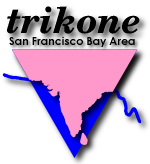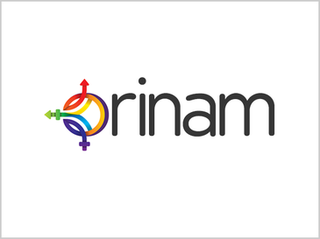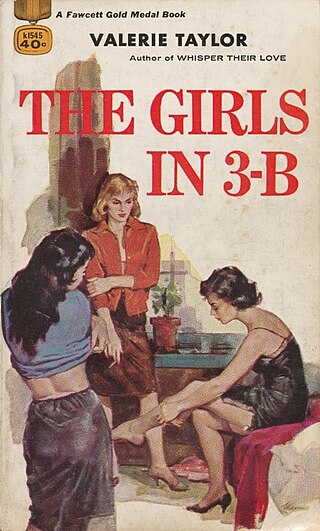Related Research Articles

A lesbian is a homosexual woman or girl. The word is also used for women in relation to their sexual identity or sexual behavior, regardless of sexual orientation, or as an adjective to characterize or associate nouns with female homosexuality or same-sex attraction. The concept of "lesbian" to differentiate women with a shared sexual orientation evolved in the 20th century. Throughout history, women have not had the same freedom or independence as men to pursue homosexual relationships, but neither have they met the same harsh punishment as gay men in some societies. Instead, lesbian relationships have often been regarded as harmless, unless a participant attempts to assert privileges traditionally enjoyed by men. As a result, little in history was documented to give an accurate description of how female homosexuality was expressed. When early sexologists in the late 19th century began to categorize and describe homosexual behavior, hampered by a lack of knowledge about homosexuality or women's sexuality, they distinguished lesbians as women who did not adhere to female gender roles. They classified them as mentally ill—a designation which has been reversed since the late 20th century in the global scientific community.

Butch and femme are masculine (butch) or feminine (femme) identities in the lesbian subculture which have associated traits, behaviors, styles, self-perception, and so on. This concept has been called a "way to organize sexual relationships and gender and sexual identity". Butch–femme culture is not the sole form of a lesbian dyadic system, as there are many women in butch–butch and femme–femme relationships.

Lesbian feminism is a cultural movement and critical perspective that encourages women to focus their efforts, attentions, relationships, and activities towards their fellow women rather than men, and often advocates lesbianism as the logical result of feminism. Lesbian feminism was most influential in the 1970s and early 1980s, primarily in North America and Western Europe, but began in the late 1960s and arose out of dissatisfaction with the New Left, the Campaign for Homosexual Equality, sexism within the gay liberation movement, and homophobia within popular women's movements at the time. Many of the supporters of Lesbianism were actually women involved in gay liberation who were tired of the sexism and centering of gay men within the community and lesbian women in the mainstream women's movement who were tired of the homophobia involved in it.
A "Boston marriage" was, historically, the cohabitation of two wealthy women, independent of financial support from a man. The term is said to have been in use in New England in the late 19th–early 20th century. Some of these relationships were romantic in nature and might now be considered a lesbian relationship; others were not.
Feminist separatism is the theory that feminist opposition to patriarchy can be achieved through women's separation from men. Much of the theorizing is based in lesbian feminism.
Lillian Faderman is an American historian whose books on lesbian history and LGBT history have earned critical praise and awards. The New York Times named three of her books on its "Notable Books of the Year" list. In addition, The Guardian named her book, Odd Girls and Twilight Lovers, one of the Top 10 Books of Radical History. She was a professor of English at California State University, Fresno, which bestowed her emeritus status, and a visiting professor at University of California, Los Angeles (UCLA). She retired from academe in 2007. Faderman has been referred to as "the mother of lesbian history" for her groundbreaking research and writings on lesbian culture, literature, and history.

Trikone is a non-profit support, social, and political organization for South Asian bisexual, lesbian, gay, and transgender people. It was founded in 1986 in the San Francisco Bay Area and is one of the oldest groups of its kind in the world. South Asians affiliated with Trikone are from or trace their ancestry to the following countries: Afghanistan, Bangladesh, Bhutan, India, Maldives, Burma, Nepal, Pakistan, Sri Lanka, and Tibet. Trikone published an eponymous magazine with an international base of subscribers several times a year. The magazine was the oldest South Asian LGBT magazine in the U.S., and ran from 1986 to 2014.
Fannie Mae Clackum was the first person to successfully challenge her discharge on the grounds of homosexuality from the U.S military.

India's LGBTQ culture has recently progressed in its cities due to the growing acceptance of the LGBTQ community in urban India in the 21st century.

Odd Girls and Twilight Lovers: A History of Lesbian Life in Twentieth-Century America is a non-fiction book by Lillian Faderman chronicling lesbian life in the 20th century. In 1992, it won the Stonewall Book Award for non-fiction and was selected as the "Editor's Choice" at the Lambda Literary Awards. In September 2011, Ms. magazine ranked the book 99th on its list of the top 100 feminist non-fiction books.
This is a timeline of notable events in the history of non-heterosexual conforming people of South Asian ancestry, who may identify as LGBTIQGNC, men who have sex with men, or related culturally-specific identities such as Hijra, Aravani, Thirunangaigal, Khwajasara, Kothi, Thirunambigal, Jogappa, Jogatha, or Shiva Shakti. The recorded history traces back at least two millennia.
Chennai has LGBTQIA cultures that are diverse concerning- socio-economic class, gender, and degree of visibility and politicisation. They have historically existed in the margins and surfaced primarily in contexts such as transgender activism and HIV prevention initiatives for men having sex with men (MSM) and trans women (TG).

Orinam is a non-funded, social, and activist collective that works to enhance understanding of alternate sexualities and gender identities among families, communities and society. It was founded in 2003 in Chennai under the name MovenPick and is one of the oldest collective of its kind in India. People affiliated with Orinam are from or trace their ancestry to the following geo-cultural: People of Tamil Origin from Tamil Nadu, India. Orinam provides a platform for creative expression, personal and social commentary by Queer people of Tamil Origin and of Indian Origin primarily. Orinam also acts as a local support group in Chennai for the queer community. Orinam also partners with the city-, state- and national initiatives around decriminalisation of homosexuality by amending Section 377 of the Indian Penal Code and LGBTQ rights.
Shamakami was an early organization of South Asian lesbians and bisexual women based in the United States. They published a newsletter of the same name between June 1990 and February 1997.
Khush: South Asian Lesbian and Gay Association was a queer collective activist organization in Canada geared towards South Asian men and women whose goal was to promote a better understanding of South Asian culture and values within the gay and lesbian community.
Beverly Shaw was an American nightclub singer whose career centered on lesbian clubs in California. She was also the owner of a gay nightclub in Los Angeles, California, United States.
Elizabeth Meese was an American academic who specialized in feminist theory. She was a professor at the University of Alabama, in the English Department, which named an award for her, the "Elizabeth Meese Memorial Award in Feminist Theory".

The Girls in 3-B is a classic work of lesbian pulp fiction by Valerie Taylor which was published in 1959 by Fawcett. Its happy ending for a lesbian character was unusual for the time period. It was one of the first three novels of any pulp fiction genre to be reprinted in 2003 by Feminist Press.
References
- ↑ "Magazines and Journals". Orinam. Orinam. Retrieved 2015-05-30.
- ↑ "United States". Connexions (29): 31. 1989.
- ↑ Ordona, Trinity (2002). Coming Out Together: An Ethnohistory of the Asian and Pacific Islander Queer Women's and Transgendered People's Movement of San Francisco. 2012. ISBN 978-0415978088.
- 1 2 Shah, Nayan (1998). "Sexuality, Identity, and the Uses of History". In David L. Eng; Alice Y. Hom (eds.). Q & A: Queer in Asian America.
- ↑ Lillian Faderman (20 August 2013). Odd Girls and Twilight Lovers: A History of Lesbian Life in Twentieth-Century America. Columbia University Press. ISBN 978-0-231-53074-3.
- ↑ Khayal; Utsa; Heske, Susan (1986). Utsa (ed.). "There Are, Always Have Been, Always Will Be Lesbians in India". Conditions (13): 145. ISSN 0147-8311. OCLC 3232386 . Retrieved September 10, 2016– via Independent Voices.
- ↑ Anu (1987). "Sexuality, Lesbianism and South Asian Feminism". In C. Chung; A. Kim; A.L. Lemeshewsky (eds.). Anthology by Pacific/Asian Lesbians of Santa Cruz, California.
- ↑ Anderson, Shelley (1991). Out in the World: International Lesbian Organizing. Firebrand Books. p. 20. ISBN 978-1-56341-005-5.
- 1 2 Anamika. OCLC 61120598.
- ↑ Lillian Faderman (20 August 2013). Odd Girls and Twilight Lovers: A History of Lesbian Life in Twentieth-Century America. Columbia University Press. p. 358. ISBN 978-0-231-53074-3.